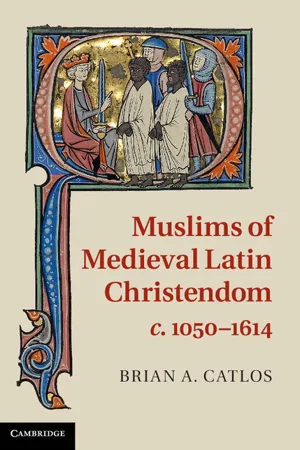
- English
- PDF
- Available on iOS & Android
Muslims of Medieval Latin Christendom, c.1050–1614
About This Book
Through crusades and expulsions, Muslim communities survived for over 500 years, thriving in medieval Europe. This comprehensive study explores how the presence of Islamic minorities transformed Europe in everything from architecture to cooking, literature to science, and served as a stimulus for Christian society to define itself. Combining a series of regional studies, Catlos compares the varied experiences of Muslims across Iberia, southern Italy, the Crusader Kingdoms and Hungary to examine those ideologies that informed their experiences, their place in society and their sense of themselves as Muslims. This is a pioneering new narrative of the history of medieval and early modern Europe from the perspective of Islamic minorities; one which is not, as we might first assume, driven by ideology, isolation and decline, but instead one in which successful communities persisted because they remained actively integrated within the larger Christian and Jewish societies in which they lived.
Frequently asked questions
Information
Table of contents
- Cover
- Half-title page
- Title page
- Copyright page
- Dedication
- Contents
- Illustrations
- Maps
- Preface
- Acknowledgements
- Abbreviations
- Note on usage
- Introduction: Islam and Latin Christendom to 1050
- Part 1 Static diasporas: Muslim communities of Latin Christendom
- 1 The tide turns: The Christian Spains i (c. 1055–c. 1150)
- 2 A triumph of pragmatism: The Christian Spains ii (c. 1150–c. 1320)
- 3 Pushing the boundaries: Italy and North Africa (c. 1050–c. 1350)
- 4 Infidels in the Holy Land: The Latin East (1099–1291)
- 5 Diversity in an age of crises: The Christian Spains iii (c. 1350–1526)
- 6 Strangers in strange lands: Foreign Muslims and slaves in Latin Christendom (c. 1050–c.1550)
- 7 Christians in name: The Morisco problem (1499–1614)
- Part 2 Living in sin: Islamicate society under Latin dominion
- 8 Thought: Images and ideals of Muslims and Islamicate society in Latin Christendom
- 9 Word: Law, administration and Islamicate society under Latin rule
- 10 Deed: The economic, social, and cultural life of the Muslims of Latin Christendom
- Postscript: Convivencia, intolerance . . . or “questions badly put”?
- Glossary
- Bibliography
- Index